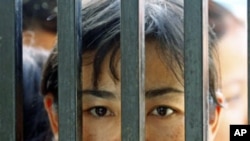Burma has announced it will release thousands of prisoners as part of a general amnesty amid indications that political prisoners could be among those set free. A leading rights group has dismissed the news, though, as a ploy that shows no real change in policy.
Burma’s state TV announced Tuesday that authorities would release more than 6,300 prisoners as part of an amnesty plan.
Myanmar Radio and Television 4 said officials have prepared a list of the prisoners who will be set free, but did not name anyone.
The news reader said prisoners who already have served parts of their sentences with good behavior will be released under a humanitarian amnesty by President Thein Sein. He said 6,359 inmates will be set free beginning Wednesday in accordance with the constitution.
There was no confirmation, however, that any of Burma’s estimated 2,000 political prisoners will be among those given amnesty.
On-screen text during the announcement repeated the official line that Burma has no political prisoners, only criminals. But there have been other indications that some political prisoners are about to be released.
Tuesday’s edition of the official New Light of Myanmar newspaper published a plea from Burma’s Human Rights Commission urging Sein to release “prisoners of conscience.” On Monday, a Norwegian deputy foreign affairs minister told VOA's Burmese service that parliament speaker Thura Shwe Mann assured him political prisoners will be released beginning within days.
Critics of Burma’s government say that even if the political prisoners are freed, that does not indicate a change of policy by authorities.
Bo Kyi, a spokesman for the Thailand-based Association for Political Prisoners in Burma, said authorities’ refusal to recognize the existence of political prisoners means they would still have criminal records.
Lawyers arrested for defending democracy activists would be unable to practice law, he said, and students sentenced for protesting would not be allowed to continue their studies.
“The European Union or the United States should consider what they are saying and should maybe carefully interpret what they are saying. Right now, I don’t see any policy changes. So, what we need is first like policy changes to recognize them as political prisoners to release them as political prisoners,” he said.
Bo Kyi also said the amnesty is a ploy to get economic sanctions against Burma lifted and to increase support for the country to host the Association of Southeast Asian Nations meetings in 2014.
He notes even as the amnesty was announced, recently arrested political activists are on trial and a journalist imprisoned for photographing a bombing had his sentence increased.
On Monday, the U.S. Assistant Secretary of State Kurt Campbell told an audience in Bangkok that there have been dramatic developments in Burma, but Washington is waiting for more substantial moves.
“We are prepared for a new chapter in our relations and we are watching carefully developments on the ground. And, I think it would be fair to say that we will match their steps with comparable steps,” said Campbell.
Campbell listed the release of political prisoners among several steps the United States wants to see Burma take.
Skepticism Meets Burma's Prisoner-Release Plan




